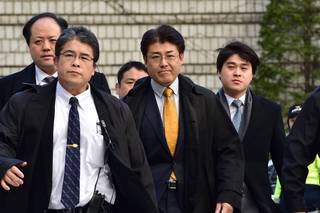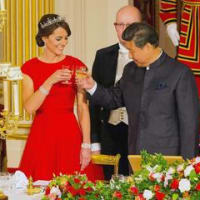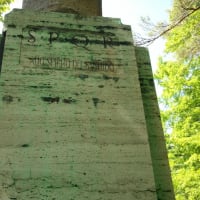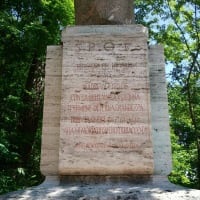
Japanese Journalist Found Not Guilty of Defaming South Korean President
Korean foreign affairs ministry says acquittal will ‘lift the pressure’ on relations between the countries
http://www.wsj.com/articles/japanese-journalist-found-not-guilty-of-defaming-south-korean-president-1450353287
By JONATHAN CHENG
Updated Dec. 17, 2015 7:10 a.m. ET
0 COMMENTS
SEOUL—A South Korean court Thursday found a Japanese journalist not guilty of defaming South Korea’s president, a decision that could help defuse tensions between the two East Asian nations.
In a sign of the diplomatic stakes at play, a spokesman for South Korea’s Ministry of Foreign Affairs said Thursday that the acquittal of Tatsuya Kato, the former Seoul bureau chief for the Japanese daily Sankei Shimbun, would “lift the pressure” on relations between the two U.S. allies.
In fact, Mr. Kato may have gotten an assist from the ministry, which said Thursday that it had appealed to the Ministry of Justice for leniency in the journalist’s case.
Mr. Kato was indicted in October 2014 on a charge of defaming South Korean President Park Geun-hye by citing rumors about her activities immediately after a deadly ferry sinking last year that prosecutors called “false facts.”
The journalist, whose online article had cited a major South Korean newspaper and unnamed financial-industry sources in questioning Ms. Park’s whereabouts during those critical hours, was barred from leaving the country.
The Sankei article was published on the newspaper’s website but not in print editions. Mr. Kato had been indicted on a charge of online defamation, which carries a stiffer penalty than offline defamation in South Korea. The maximum penalty for online defamation is seven years in prison.
Prosecutors had been seeking an 18-month prison term. They couldn’t be immediately reached for comment after the verdict was delivered in Seoul Central District Court.
Sankei Shimbun’s chief executive, Takamitsu Kumasaka, said he regretted that the case had been a “major diplomatic issue” between Japan and South Korea. “We express respect to the court which judged the case as ‘covered by protection of freedom of speech’ guaranteed by the constitution,” he said in a statement.
The indictment of Mr. Kato had drawn rebukes from Tokyo and Washington, which called South Korea’s laws antiquated and problematic.
The acquittal could help soothe tensions between Tokyo and Seoul, which have sparred over historical and territorial issues in recent years. Japanese Prime Minister Shinzo Abe and Ms. Park agreed at a summit last month to resolve a dispute over Korean women who were enlisted by Japanese occupiers as sexual slaves during World War II. Ms. Park said she had hoped to strike a deal by the end of the year.
Japanese Prime Minister Shinzo Abe said Thursday that he welcomed the ruling and that he hoped the two countries could build a forward-looking relationship.
The verdict could also blunt criticisms from free-speech advocates and rights groups about Ms. Park’s tolerance for dissent, on the heels of several major protests in downtown Seoul. In recent weeks, tens of thousands of protesters have taken to the streets to air an array of grievances against Ms. Park, whom they accuse of eroding democracy in the country.
South Korea has a history of suppressing free speech under military rulers who controlled the country until the 1980s. It has since transitioned to democracy, but the U.S. is among those who have criticized South Korea’s National Security Law for being used to silence critics of the government.
The government has rejected such charges.
“South Korea probably realized that there were external reputational costs to punishing a reporter for writing an article,” says Robert Kelly, a professor of political science at Pusan National University in South Korea. “Cooler voices probably prevailed in the administration, saying this is not a good idea.”
Mr. Kelly also predicted that a guilty verdict would have kicked off a vicious cycle between Tokyo and Seoul.
“It’s very easy for this to become a tit-for-tat,” he said. “This is the kind of thing that goes downhill very quickly.”
Before the verdict, rights groups had raised concerns about the trial. Following the decision, Phil Robertson, deputy director of Human Rights Watch’s Asia division, said in a statement that it was a relief Mr. Kato wasn’t sent to prison, “but that doesn’t change the fact that South Korea’s criminal defamation law is problematic because it stifles a free press, has a chilling effect on freedom of expression, and works against the public interest by gagging critics and whistleblowers.” Mr. Robertson added that the government should immediately repeal its criminal defamation law.
—Min Sun Lee and Chieko Tsuneoka contributed to this article.
Write to Jonathan Cheng at jonathan.cheng@wsj.com
-------------------
[jamawns' comment]
-------------------
“false facts.”? What happened during the 7 hours?
"dispute"? Let me introduce real Korean textbook like 'Fantasy'.
(F1) BC17-BC11, Chinese first kingdom 'Yin' fought against Great Korea Empire 'Chosun'.
https://goo.gl/a7N3oT
(F2) AD7-AD10, Chinese Empire 'Tang' was smaller than Korea 'Shilla' occupying Japan.
https://goo.gl/Zzfnva
(F3) AD10-AD13, Chinese Empire 'Song' got smaller due to expansion of Korea 'Goryeo' occupying not only Japan but also Taiwan.
https://goo.gl/Kd9SGC
(F4) Korean three dynasty dominated over East Asia.
https://goo.gl/oWwU7b
(F5) Korean ancient civilization was paralleled with Egypt, Mesopotamia, Indus, China.
https://goo.gl/0csNuh
Here is 'World' standard liberal-arts.
(W1) AD7-AD10, Chinese Empire 'Tang' is diffrent from Tibet and Manchuria.
https://goo.gl/EHvpZr
(W2)Samuel Phillips Huntington's civilization classification.
https://goo.gl/xia0TJ
Korean foreign affairs ministry says acquittal will ‘lift the pressure’ on relations between the countries
http://www.wsj.com/articles/japanese-journalist-found-not-guilty-of-defaming-south-korean-president-1450353287
By JONATHAN CHENG
Updated Dec. 17, 2015 7:10 a.m. ET
0 COMMENTS
SEOUL—A South Korean court Thursday found a Japanese journalist not guilty of defaming South Korea’s president, a decision that could help defuse tensions between the two East Asian nations.
In a sign of the diplomatic stakes at play, a spokesman for South Korea’s Ministry of Foreign Affairs said Thursday that the acquittal of Tatsuya Kato, the former Seoul bureau chief for the Japanese daily Sankei Shimbun, would “lift the pressure” on relations between the two U.S. allies.
In fact, Mr. Kato may have gotten an assist from the ministry, which said Thursday that it had appealed to the Ministry of Justice for leniency in the journalist’s case.
Mr. Kato was indicted in October 2014 on a charge of defaming South Korean President Park Geun-hye by citing rumors about her activities immediately after a deadly ferry sinking last year that prosecutors called “false facts.”
The journalist, whose online article had cited a major South Korean newspaper and unnamed financial-industry sources in questioning Ms. Park’s whereabouts during those critical hours, was barred from leaving the country.
The Sankei article was published on the newspaper’s website but not in print editions. Mr. Kato had been indicted on a charge of online defamation, which carries a stiffer penalty than offline defamation in South Korea. The maximum penalty for online defamation is seven years in prison.
Prosecutors had been seeking an 18-month prison term. They couldn’t be immediately reached for comment after the verdict was delivered in Seoul Central District Court.
Sankei Shimbun’s chief executive, Takamitsu Kumasaka, said he regretted that the case had been a “major diplomatic issue” between Japan and South Korea. “We express respect to the court which judged the case as ‘covered by protection of freedom of speech’ guaranteed by the constitution,” he said in a statement.
The indictment of Mr. Kato had drawn rebukes from Tokyo and Washington, which called South Korea’s laws antiquated and problematic.
The acquittal could help soothe tensions between Tokyo and Seoul, which have sparred over historical and territorial issues in recent years. Japanese Prime Minister Shinzo Abe and Ms. Park agreed at a summit last month to resolve a dispute over Korean women who were enlisted by Japanese occupiers as sexual slaves during World War II. Ms. Park said she had hoped to strike a deal by the end of the year.
Japanese Prime Minister Shinzo Abe said Thursday that he welcomed the ruling and that he hoped the two countries could build a forward-looking relationship.
The verdict could also blunt criticisms from free-speech advocates and rights groups about Ms. Park’s tolerance for dissent, on the heels of several major protests in downtown Seoul. In recent weeks, tens of thousands of protesters have taken to the streets to air an array of grievances against Ms. Park, whom they accuse of eroding democracy in the country.
South Korea has a history of suppressing free speech under military rulers who controlled the country until the 1980s. It has since transitioned to democracy, but the U.S. is among those who have criticized South Korea’s National Security Law for being used to silence critics of the government.
The government has rejected such charges.
“South Korea probably realized that there were external reputational costs to punishing a reporter for writing an article,” says Robert Kelly, a professor of political science at Pusan National University in South Korea. “Cooler voices probably prevailed in the administration, saying this is not a good idea.”
Mr. Kelly also predicted that a guilty verdict would have kicked off a vicious cycle between Tokyo and Seoul.
“It’s very easy for this to become a tit-for-tat,” he said. “This is the kind of thing that goes downhill very quickly.”
Before the verdict, rights groups had raised concerns about the trial. Following the decision, Phil Robertson, deputy director of Human Rights Watch’s Asia division, said in a statement that it was a relief Mr. Kato wasn’t sent to prison, “but that doesn’t change the fact that South Korea’s criminal defamation law is problematic because it stifles a free press, has a chilling effect on freedom of expression, and works against the public interest by gagging critics and whistleblowers.” Mr. Robertson added that the government should immediately repeal its criminal defamation law.
—Min Sun Lee and Chieko Tsuneoka contributed to this article.
Write to Jonathan Cheng at jonathan.cheng@wsj.com
-------------------
[jamawns' comment]
-------------------
“false facts.”? What happened during the 7 hours?
"dispute"? Let me introduce real Korean textbook like 'Fantasy'.
(F1) BC17-BC11, Chinese first kingdom 'Yin' fought against Great Korea Empire 'Chosun'.
https://goo.gl/a7N3oT
(F2) AD7-AD10, Chinese Empire 'Tang' was smaller than Korea 'Shilla' occupying Japan.
https://goo.gl/Zzfnva
(F3) AD10-AD13, Chinese Empire 'Song' got smaller due to expansion of Korea 'Goryeo' occupying not only Japan but also Taiwan.
https://goo.gl/Kd9SGC
(F4) Korean three dynasty dominated over East Asia.
https://goo.gl/oWwU7b
(F5) Korean ancient civilization was paralleled with Egypt, Mesopotamia, Indus, China.
https://goo.gl/0csNuh
Here is 'World' standard liberal-arts.
(W1) AD7-AD10, Chinese Empire 'Tang' is diffrent from Tibet and Manchuria.
https://goo.gl/EHvpZr
(W2)Samuel Phillips Huntington's civilization classification.
https://goo.gl/xia0TJ










![[Sputonic] What's Behind Japan 'Wavering' Between Two Opposing Policies Towards Russia](https://blogimg.goo.ne.jp/image/upload/f_auto,q_auto,t_image_square_m/v1/user_image/7c/d8/c11144c8fd1ce7dd82fbe843c0d343a5.jpg)
![[Sputonic] Russia regrets Japan distorting WWII facts](https://blogimg.goo.ne.jp/image/upload/f_auto,q_auto,t_image_square_m/v1/user_image/57/06/793fc0e53452ae59778dc2d8ecbaa8ba.jpg)
![[WSJ] Taiwan’s Historic Election Set to Test China Ties](https://blogimg.goo.ne.jp/image/upload/f_auto,q_auto,t_image_square_m/v1/user_image/25/98/95904d9d578fce5f80ca404cf96bdcab.jpg)


![[WSJ] World War II Anniversary Opens Old Wounds in Japan Over How Much to Apologize (3/3)](https://blogimg.goo.ne.jp/image/upload/f_auto,q_auto,t_image_square_m/v1/user_image/19/28/6cbc12baf2a79a285750c1f78f53d33f.jpg)



※コメント投稿者のブログIDはブログ作成者のみに通知されます